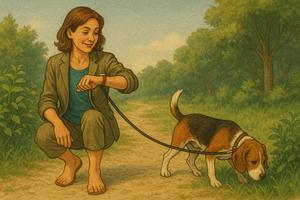Pets
/Home & Leisure
Video
No body
Video
No body
Video
No body
Video
No body

How Pets Experience Time When You’re Gone
By now, most pet owners have asked some version of the same quiet question while locking the door behind them: *Do they know how long I’ll be gone?* The answer, like most things involving animals, is stranger and more interesting than a simple yes or no.
Pets do not experience time the way humans do. They don’t count minutes, anticipate ...Read more
Good Samaritan with envelopes of cash covers hundreds of dollars of pet owners' medical bills
DENVER — Adam Wilson’s week was bad — and getting worse.
On Monday, the Denver man said goodbye to his elderly cat at Wheat Ridge Animal Hospital. Three days later, he found himself with his dog, injured in a Christmas Eve fight with another dog, at the same facility to patch up a worrisome bite wound.
It was Christmas morning and Wilson...Read more

Duke and Duchess of Sussex 'sat on the floor' as their beloved dog underwent surgery
Meghan, Duchess of Sussex and Prince Harry "sat on the floor" when their beloved dog was having surgery.
Professor Noel Fitzpatrick - the star of the British TV show The Supervet - has reflected on how he operated on the royal couple's beagle Guy in 2017 when the pooch was hurt.
Fitzpatrick, 58, told The Times newspaper: "Meghan rang me from ...Read more

Georgia man convicted on 67 counts of dogfighting, could get life, feds say
ATLANTA — The 67 dogs were on heavy chains, many without food, water or shelter, on a sprawling 17-acre property in South Georgia, according to federal prosecutors.
Many had wounds and scars from dogfighting, and some were aggressive to the other dogs. There was evidence Dun Bradford had been breeding the pit bull-type dogs for fighting for ...Read more

The science of zoomies
If you’ve ever watched a dog tear through the house like it’s possessed, or a cat ricochet off furniture as if chased by invisible bees, you’ve witnessed a phenomenon pet owners know well: the zoomies. The technical term is FRAPs — Frenetic Random Activity Periods — but that clinical label barely captures the joy, chaos, and mystery of...Read more

Traveling with Cats and Dogs: What to Know Before You Go
Traveling with pets used to be a niche endeavor reserved for the determined or the desperate. Today, it is increasingly mainstream. More hotels advertise pet-friendly policies, airlines have refined in-cabin rules, and owners are less willing to leave animals behind. Yet the romantic image of a dog with its head out the car window or a cat ...Read more

Pets and Predictability: Why Routine Matters More Than Toys
By the time many pet owners realize something is wrong, the symptoms are already familiar: a dog pacing at dusk, a cat yowling at night, chewed furniture, shredded paper, sudden clinginess, or withdrawal. The first response is often to add stimulation — a new toy, a puzzle feeder, a longer walk, a different treat.
Sometimes that helps. Often,...Read more

Why Pets Sit on Our Stuff (and Why It’s a Compliment)
If you live with a pet, you already know the scene. You set down your laptop for ten seconds. A cat appears. You fold clean laundry. A dog settles squarely on top of it. You open a book, answer a text, turn away for a moment — and suddenly the most inconvenient object in the room has become prime real estate.
At first, it feels mischievous, ...Read more

Why Pets Follow Us Everywhere
If you live with a dog or cat long enough, you learn a peculiar truth: privacy is largely theoretical. Stand up from the couch, and there’s a thump of paws. Walk into the kitchen, and someone appears behind you. Head to the bathroom, and suddenly you have company. To pet owners, it’s familiar and often endearing — but the behavior runs ...Read more

Charlie Cox 'replaced' by family dog
Charlie Cox thinks his wife has "replaced" him with their dog.
The Daredevil actor married Samantha Thomas - with whom he has a son and a daughter - in September 2018 and he joked he spends so much time away working that the producer has grown "way too close" to their family pet.
He told People magazine: "My wife and our dog have a very effed-...Read more

What Your Pet Knows About You That You Don’t
Dogs and cats often seem to understand their owners in ways that defy explanation. A pet greets someone gently after a bad day, lingers near an owner before illness appears, or reacts to stress before a word is spoken. While these moments can feel mysterious, science and behavior research suggest that pets are reading signals most humans ...Read more

Cats and Cold Weather: What Owners Should Know When Temperatures Drop
As winter settles in, many cat owners assume their pets’ fur coats provide all the protection they need against the cold. While cats are remarkably adaptable animals, cold weather presents real risks—especially for outdoor cats, seniors, kittens and cats with medical conditions. Understanding how cats experience cold, and how to protect them...Read more

When winter bites, preparation matters
Walking a dog in very cold weather or snow can be invigorating, practical and even joyful — but it demands more preparation than a casual stroll in mild temperatures. Cold, wind, ice and snow affect dogs differently depending on size, coat, age and health. They also affect the human at the other end of the leash. The right gear does not just ...Read more

Why Dogs Need Sniff Walks: The Neuroscience of Olfactory Enrichment
For generations, dog owners have thought of walks primarily as exercise — a chance for a dog to stretch its legs, burn energy, and relieve itself. But animal-behavior researchers say this traditional view overlooks the most important part of a dog’s outdoor experience: the nose.
Across parks, sidewalks, and backyards, dogs aren’t just ...Read more

The New Attachment Figure: Why Pets Are Filling the Role of Best Friend, Therapist, and Anchor
In living rooms, studio apartments, and suburban kitchens across the country, a quiet shift has taken place in the emotional architecture of modern life. Dogs curl beside laptops during work-from-home meetings. Cats perch on bookshelves during long nights of writing. Rabbits sit calmly beside children during moments of fear or uncertainty. Their...Read more

Sen. Patty Murray: ICE dog attack on Wash. man 'should shock the conscience'
When a man dressed as a construction worker knocked on Wilmer Toledo-Martinez’s door claiming to have hit his car, he believed it was an accident.
Instead, ICE agents were waiting for him outside on Nov. 14.
Toledo-Martinez’s lawyer, Olia Catala, said once he went out to check on the damage and exchange insurance information, undercover ...Read more







